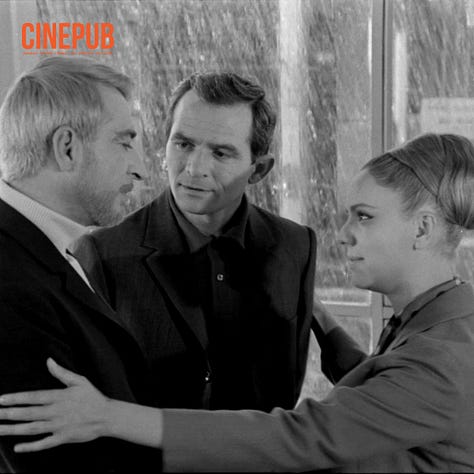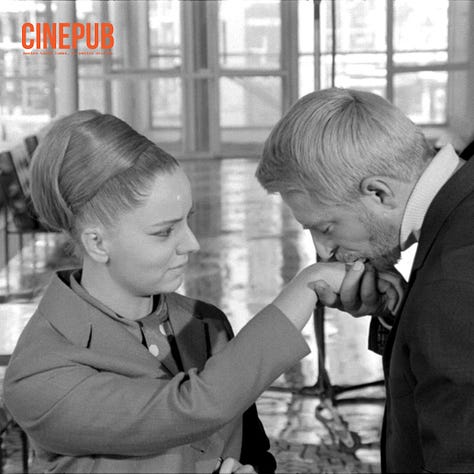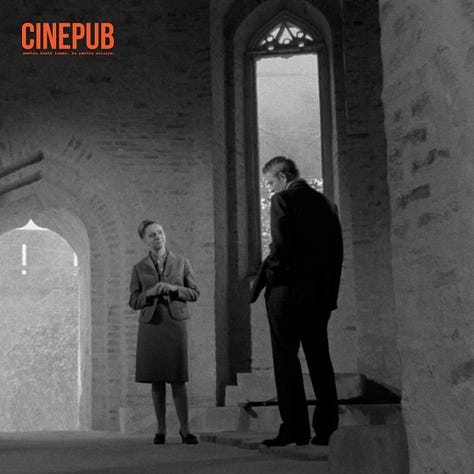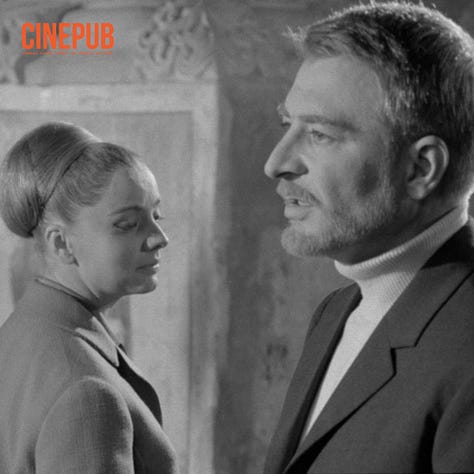The dessert of chrome and glass
I watched the film from another perspective, an analytical one, focusing on the romantic relationships and on the more or less dysfunctional personality structures
psychocinepub
Here at cinepub.ro we're trying to shift the paradigm in the conversation about cinema. I deliberately avoid the syntagm "film criticism" for multiple reasons I will elaborate another time. For now, what's most important is the accent we put on the alternative, and mostly on independence. We are not a bunch of axiologists. We don't impose, we just propose: today, a fresh voice, Augustin Cupșa.
Writer, screenwriter and psychiatrist, he was a medical practitioner in Bucharest and Paris. He received the prize for manuscript from the Writers Union of Romania and "Cartea Românească''. He published two volumes of short stories („Profesorul Bumb și macii suedezi” and „Marile bucurii și marile tristeți”), the novel „Așa să crească iarba pe noi” (nominated for PEN Prize and European Union Prize for Literature) and, again, a volume of short stories, „Străinătate”, nominated for Writers Union of Romania Prize and winner of ARIEL Prize).
We'll begin to publish, starting this summer, Augustin Cupșa's signed texts. His publications lean towards being a "sorta" applied psycho(patho)logical course on the motifs and interactions between fictional characters. His texts will be found, starting this fall, as a permanent column on cinepub.ro; a platform for discussion about movie characters' problems, such as dissociation and white noise (Malick's cinema), neurological and psychological symptoms ("Vertigo"), PTSD, trauma and mourning ("Sierranevada", "Deer Hunter"), amnesia mechanisms, the visual representation of forgetting, mirrored faces and reflections that produce abstract images, like in Tarkovski's films. Everything will surely be applied to the Romanian films already found in our portfolio.
This evening we present to you an unfairly forgotten film by a special author, Malvina Urșianu.
Instead of the basic "normal"/ "abnormal" categorization, Cupșa analyses, in a nuanced way, the manifestations of characters and classifies them based on ordinary and/ or exceptional psychological experiences. "No one is pardoned for being unbalanced. And it's better that way" (A.C.). The 'psychotherapy of cinema' column signed by Augustin Cupșa could be a good opportunity for building bridges.
This is exactly the reason to be Cinepub.
(Lucian Georgescu, cinepub.ro)
The dessert of chrome and glass
Besides being so rigidly ideological, Malvina Urșianu's first feature, "The Mona Lisa Without a Smile", can be viewed in many ways. You can watch it for Silvia Popovici's dramatic art and acting. You can see it for the cinematographic technique and language of a director successfully trained at the school of Jean Georgescu. You can watch it just to get a kick out of the idea of propaganda in the movies. You can make frames for memes or GIFs, when Caius Bengescu is left with a broken engine and, from a car, magically brought out of the blue, by a vaporous blonde (a doctor, by the way) who smiles innocently at him: "Do you need anything?"/ "A spark plug", he replies with a poet's melancholy. Or, later, in the 60s disco bar, where young couples dance politely, while Caius and Irina watch them without any regrets.
"- Their way of partying is strange to me and their movements are horrible."
"- They are the movements of a healthy and sporty generation."
I watched the film from another perspective, an analytical one, focusing on the romantic relationships and on the more or less dysfunctional personality structures and I may say that it's not easy at all to make room psychologically in such an ideologically heavy fiction. One may risk falling in the middle between both political camps. But it's still the best way that saves the aesthetic value of the film.
The film was released in 1967 – there was, at that time, a social defrost in the Socialist Republic of Romania during the beginning of Ceaușescu's regime (after Gheorghe Gheorghiu Dej).
Malvina Urșianu, a landlord's daughter, returns to cinema after being banned for eight years and interrogated by officers in prison cellars in Bucharest. I don't know how anyone could have conspired against the system at that time. Malvina Urșianu, however, seems to have achieved something surprising, camouflaging in an eternal theme – the mid-life crisis, with its nostalgias and regrets and, more deeply, the biological perishability.



As a subject and genre, "The Mona Lisa Without a Smile" is a deeply lyrical and meditative road movie. And this unusual option is well supported by Malvina's choice of characters. Caius Bengescu is the descendant of the bourgeoisie, a poet in times when prose (propaganda) is sought-after. As he himself confesses, he remained reciting poems in a public square while all the working people went about their business. They erected concrete, glass factories and chemical plants, refineries, alien-like mining machinery. In the middle of these monsters stands the engineer Irina Dinu, his first and only love, whom he cheated precisely because he could not stand her spiritual "incandescence".
Now they are in adulthood, in front of them lies the wasteland and the breeze of old age. While travelling to the chemical plant by train, Caius re-encounters Cosma, his friend and schoolmate, also hopelessly in love with this daring woman. Brought back together by fate, the three roam in an American old car through the industrial landscape of socialism in Transylvania, recreating memories and lamenting their youth.
In "The Mona Lisa Without a Smile", the directions and categories are very clear in the film: the bourgeoisie means inadequacy, falsehood, failure, lack of action, procrastination, a man who "goes in one direction, with his head turned in the other", impossible in his actions. Even if there were also some "boyars with left-wing views", as Irina says, they were rather eccentric or wanted to be "chic". Long story short, Caius fits perfectly the Jungian definition of the neurotic personality: a man who can't quite deal with the present. "He aspires to the future and melancholizes the past", as Cozma describes him to Irina, after the car accident. Technically speaking, a disharmonious personality structure takes shape in adolescence and remains unchanged in adulthood.



And it is precisely in this emotional swamp that the young engineer sinks. In that summer, the summer of '44 (obviously the beginning of the end of the boyars' times), when "the bell rang for death", as Doctor Ioana Damian says, she knew the love and the hope. She knows by heart Caius' decadent and stale poems and finishes his verses when he recites them to her. Caius asks for nothing, neither mercy nor rescue and he nobly takes his fate. The nostalgia of her age and the melancholy of the times are subtly and very cautiously mixed in her soul. She manages, with a sure gait, to conquer the audience despite the shrillness and pathos inherent in the game of time.
I don't see how you could not empathise with this woman's drama. Her youth faded in an illusion, her beauty will fade, but she is dignified and does not complain while she is condemned to never love again.









A Mona Lisa without a smile is a woman without mystery. But in a woman, the mystery is not only her beauty. The film plays out both a human and a biological tragedy. Malvina Urșianu does not skimp on visual metaphors and key-scenes to expose the passage of time and the feeling of unfulfillment of the body due to the impossibility of bonding: the ruins of the fortress (where the three friends stop), the almost abandoned church (where Irina and Caius take shelter from the rain), but the most successful one is when the two try to catch the train driving their American car. They are winning one station after another but finally they will be caught by something that cannot be stopped: their own past. Irina renders Caius to the future generations. He will rebuild his life with the girl who secretly loved him from childhood, now a doctor (the one with the replacement spark plugs in the car, just in case…). But for Irina all that remains is a "desert of chrome and glass,” an arid stretch towards old age.



That's why the film is worth watching also by those tensed, like me, by the invasion of doctrines in aesthetics. It proves that there is something beyond all, from which neither doctrines, nor love, nor bodies are immune: the waste of biological time. "As you can see, the process is more internal and nothing spectacular," says the engineer at the beginning of the movie in an interview at the factory.
(Augustin Cupșa, cinepub.ro)
This week's premiere: The Mona Lisa Without a Smile by Malvina Urșianu, 11th of July at 9:00 p.m., on CINEPUB.RO
Cinepub is the one and only, legally operating and free of charge, AVoD platform, dedicated to the Romanian cinema: independent, contemporary, or classic. Our comittment to remain “free” means hundreds of monthly hours of volunteer work of a (very) small team of passionate individuals.
Your donation can help us cover some of the costs of securing some distribution rights, covering the basic costs or just keeping the platform updated; in a nutshell, to survive! If you like what we do, if you read what we write, if you watch the films we show, consider supporting us. We need your help. Thank you!





